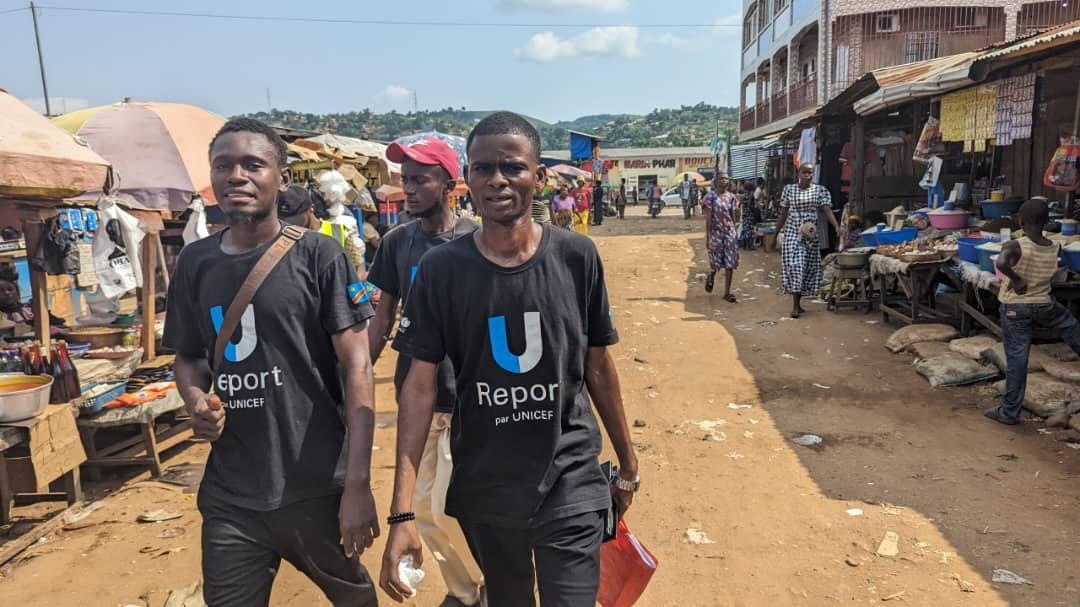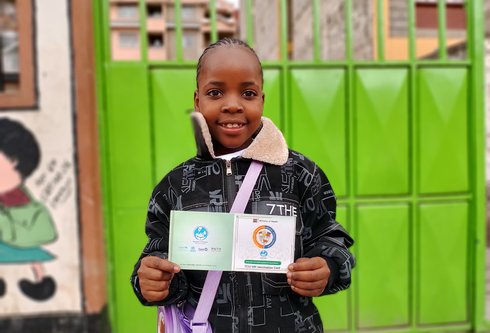In Kongo Central, a new kind of leadership is taking root—powered by youth, driven by purpose.
In the heart of the Kongo Central province, a quiet revolution is unfolding—not led by politicians or health officials, but by a determined group of young people fighting to protect their communities from one of the deadliest diseases in the Democratic Republic of the Congo.
Michael Makiese Nlandu, a 28-year-old medical student, coordinates a community of young people in Kisantu. Since September 2023, he has mobilized a dynamic network of nearly 150 young volunteers—mainly students and unemployed youth—who dedicate time daily to an important goal: building trust in vaccines and other life-saving interventions for children under 5 years of age. Their most urgent mission has been raising awareness around the new malaria vaccine introduced into the country’s routine immunization system in October 2024.
The vaccine reduces malaria episodes in children under 5 years old, the group most vulnerable to severe illness and death. Kongo Central became the first province in the DRC to begin the rollout, with support from partners, including PATH.
Training, tools, and trust
But the launch came with immediate challenges. A rapid perception survey carried out across ten health zones in Kongo Central, the country’s westernmost province, revealed that only a fraction of caregivers were willing to bring their children for vaccination. Misconceptions were widespread, with 60 percent of respondents saying they believed the vaccine could “reduce a child’s intelligence.” Others cited religious reasons or concerns about side effects.
In response, PATH sought a partnership with UNICEF to launch a bold experiment: a youth-led communication challenge aimed at increasing vaccine demand in communities most at risk of low uptake. The initiative focused on building trust, countering rumors, and helping families adhere to the recommended four-dose vaccine schedule. It combined UNICEF’s communities of young volunteers, known as U-Reporters and Web Watchers, with PATH’s deep-dive model, through which the organization provides focused technical support to seven health zones in Kongo Central. The model strengthens three pillars essential to vaccine uptake: coordination, demand generation, and data systems.
In these seven zones, PATH works alongside local health teams to build community trust, monitor progress in real time, and ensure that messages resonate with the people who need them most. The youth clubs themselves are structured, community-based groups activated through UNICEF’s digital engagement platform. Each club consists of 30–40 trained volunteers aged 15–24.
The goal is not only to increase malaria vaccine coverage now, but to create long-term demand and reduce missed doses over time.
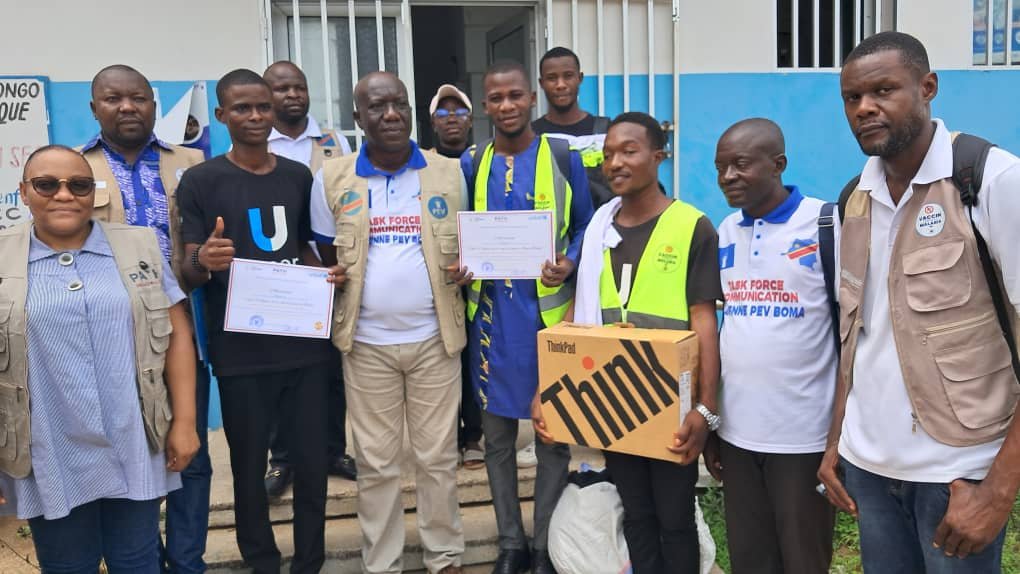
Representatives from PATH, the Ministry of Health, and the U-Report youth clubs. Credit: PATH.
A personal approach
Between November 2024 and February 2025, PATH and UNICEF provided the youths with training on malaria and immunization messaging, communication techniques, and rumor management. At the outset, they received communication materials—posters, job aids, audio spots and messaging guides—to support their outreach. Then, at the end of the challenge, all clubs were recognized with certificates of participation. The most successful groups received additional tools, such as smartphones and laptops, to encourage sustained engagement and support future initiatives.
Michael’s team in Kisantu, a health zone roughly 75 miles south Kinshasa, was one of the most successful youth groups.
“It wasn’t like the polio campaigns,” he recalls. “This was new, unfamiliar—and people were afraid.”
Instead of just facing parents in public, the youth groups decided to take a more personal approach. They knocked on doors. They sat with families, sharing stories and smiles. They answered questions one by one.
“Salvation is individual,” Michael said. “When someone opens their door and sees a familiar face from the neighborhood, they’re more likely to listen.”
In one case, a father adamantly refused to allow his granddaughter to be vaccinated, citing religious objections. But when he realized one of the youth volunteers was his neighbor’s daughter, he softened.
“If she’s involved,” he said, “then I trust it.”
Within days, the child was vaccinated.
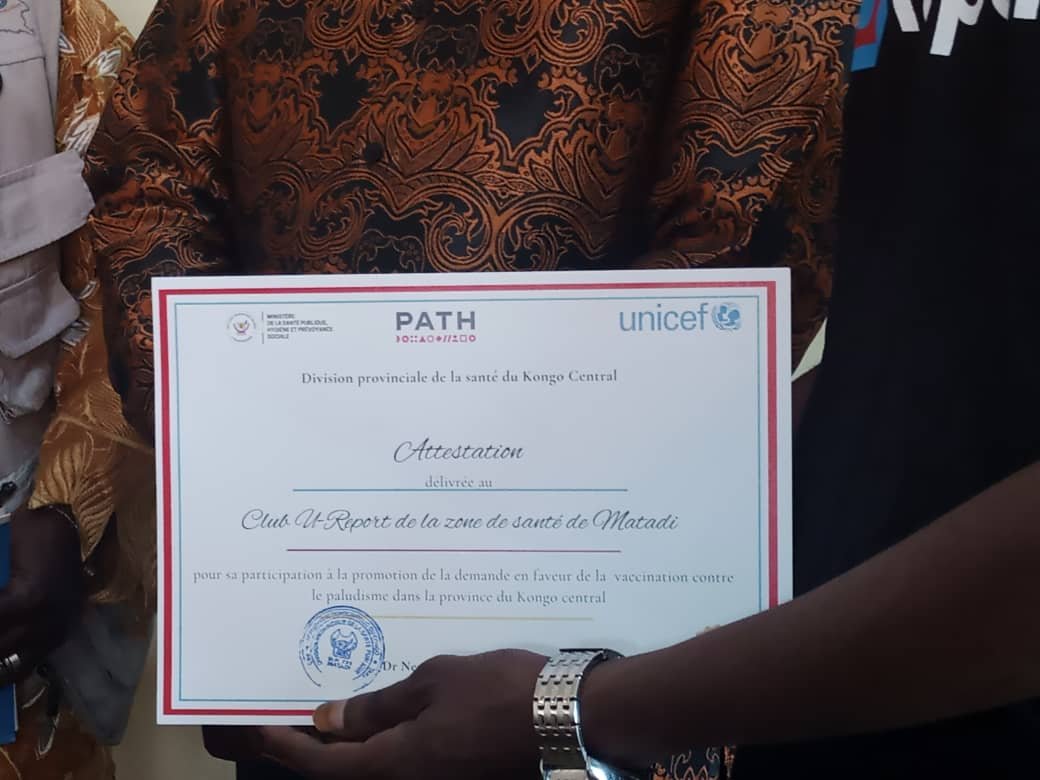
A certificate for youth engagement awarded to U-Report participants in Kongo Central. Credit: PATH.
Real challenges, real impact
Michael notes that mothers were generally more receptive than fathers.
“It’s the moms who take the child to the hospital, who sleep beside them when they’re sick. They know the value of protection,” he says.
Once a parent was convinced, the youth team often accompanied them to vaccination appointments and helped ensure they returned for follow-up doses. They also took advantage of regular child weighing sessions at health centers as informal opportunities to share information.
“It worked really well,” says Michael. “Those two approaches reinforced each other. Every moment is a chance to talk about health.”
The work wasn’t always easy. Many areas were hard to reach.
“Even batteries for the megaphones were sometimes missing,” Michael says. “It was frustrating, but we kept going. We had to.”
Still, the youth-led approach proved highly effective. Data from the ten health zones where youth clubs operated show a steady increase in vaccine coverage from January 2025. Perhaps more telling, the dropout rate between doses has significantly decreased, and increasing numbers of children are starting and completing the four-dose schedule. In some communities, the youth clubs also helped identify unvaccinated and under-vaccinated children during routine outreach sessions.
“The youth clubs played a critical role,” confirms Marie Ndambi Nzita, Communication Focal Point at the Provincial Health Division in Matadi. “We now plan to involve them [in future immunization initiatives] from planning to evaluation.”
Dr. Marius Mayuvuluanga, head of the Mbanza Ngungu health zone, agrees. “Vaccination rates were lower before the youths began their outreach. Their presence in public places and households made a real difference.”
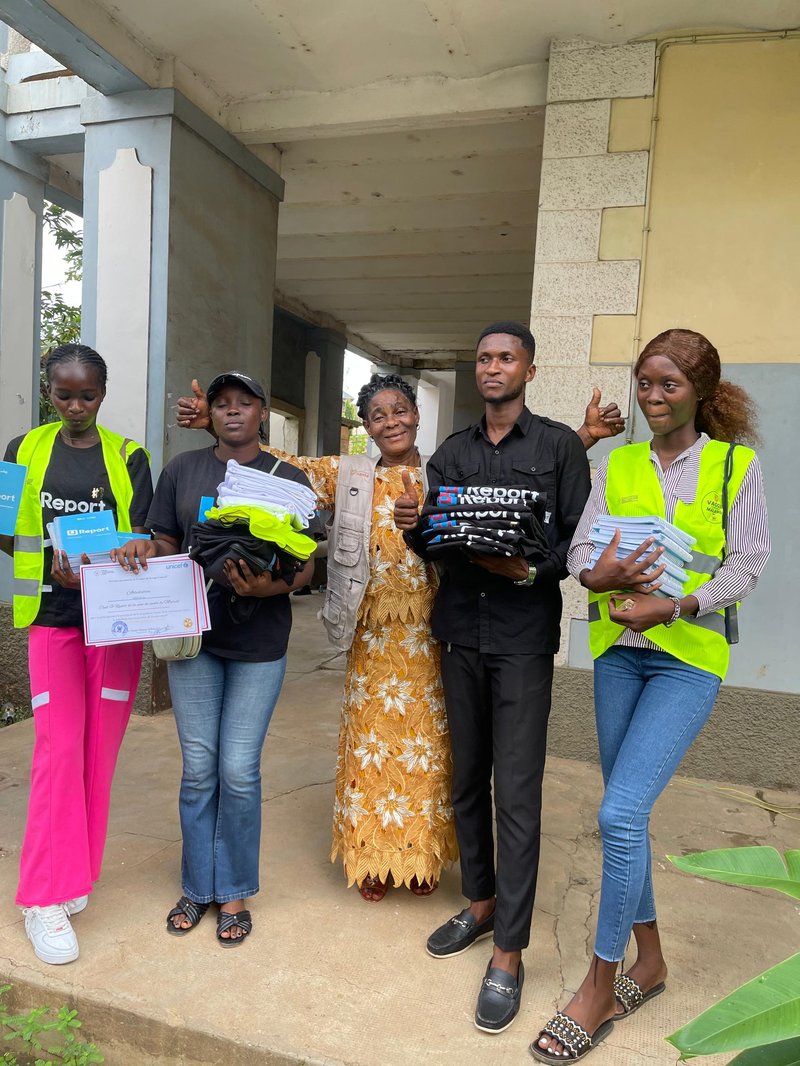
Marie Nzita, Head of Communications at the Provincial Health Department in Matadi, Kongo Central province, with U-Report participants. Credit: PATH.
The work continues
Though the formal initiative ended in February, Michael and his team continued their work. On June 8, during a community clean-up event, they spoke with parents about how standing water attracts mosquitoes and reminded them that vaccines are also essential in malaria prevention. That day, five children who had missed doses were taken to the local health center.
“Even if we’re not doing official visits, we don’t stop talking about it,” Michael said. “We ask about the vaccine when we see people, we check in on the schedule, we explain again if needed.”
PATH, UNICEF, and the Ministry of Health are now exploring ways of expanding the youth engagement model to other provinces and immunization efforts, using what worked in Kongo Central as a blueprint for broader success.
For Michael, the work is deeply personal.
“We’re not doing this for prizes,” he adds. “We do it because we care. We are a family. And our responsibility is to take care of each other.”
